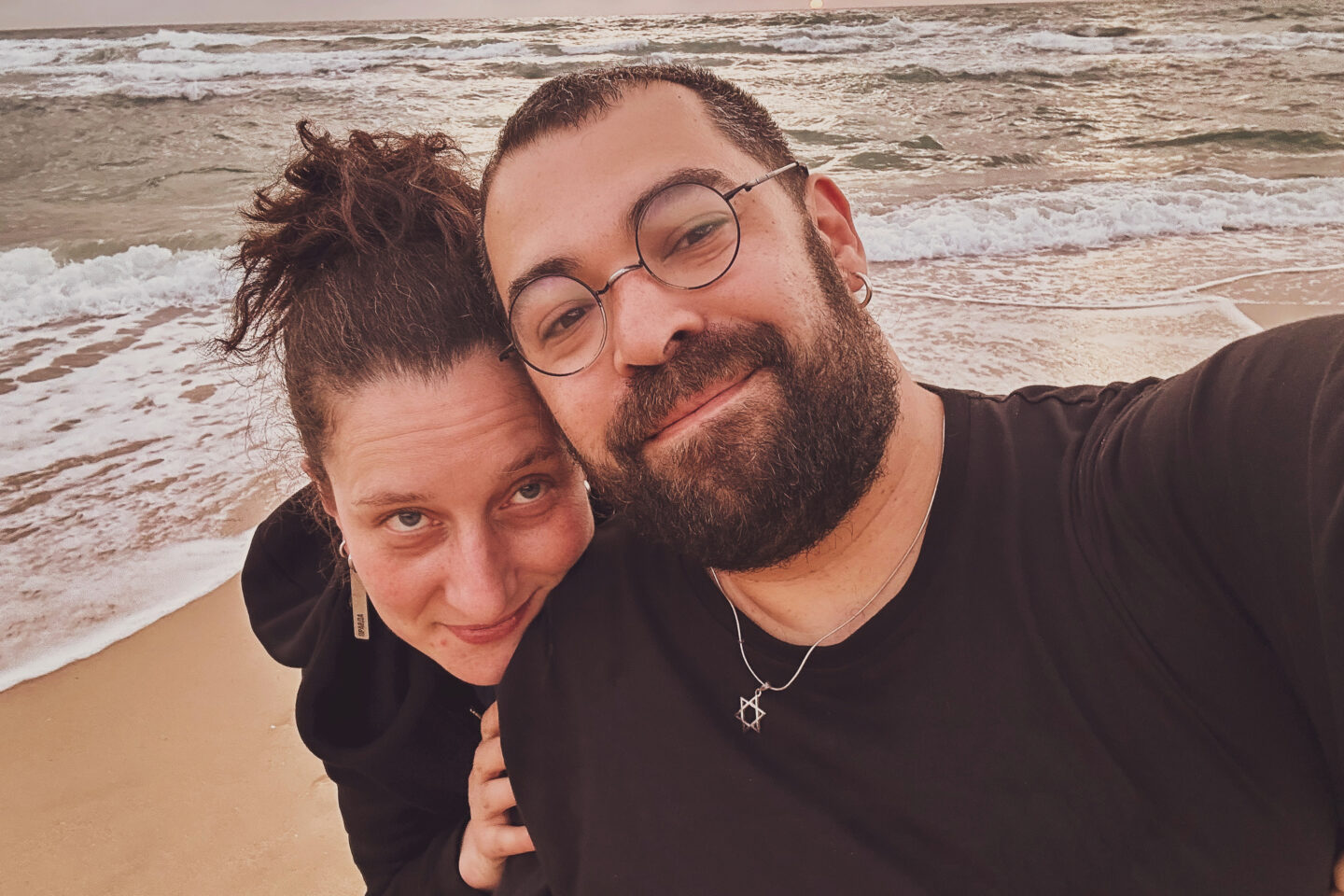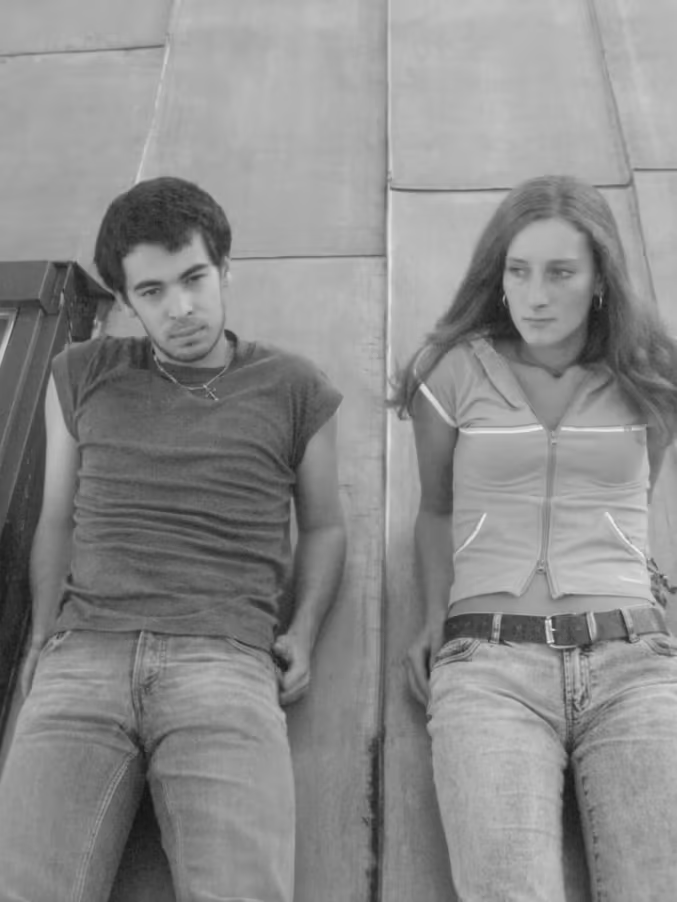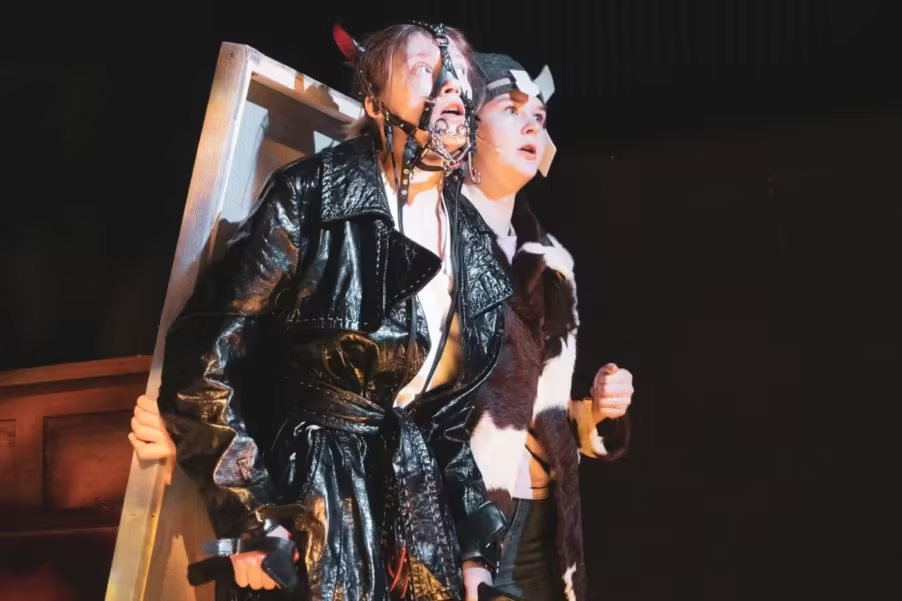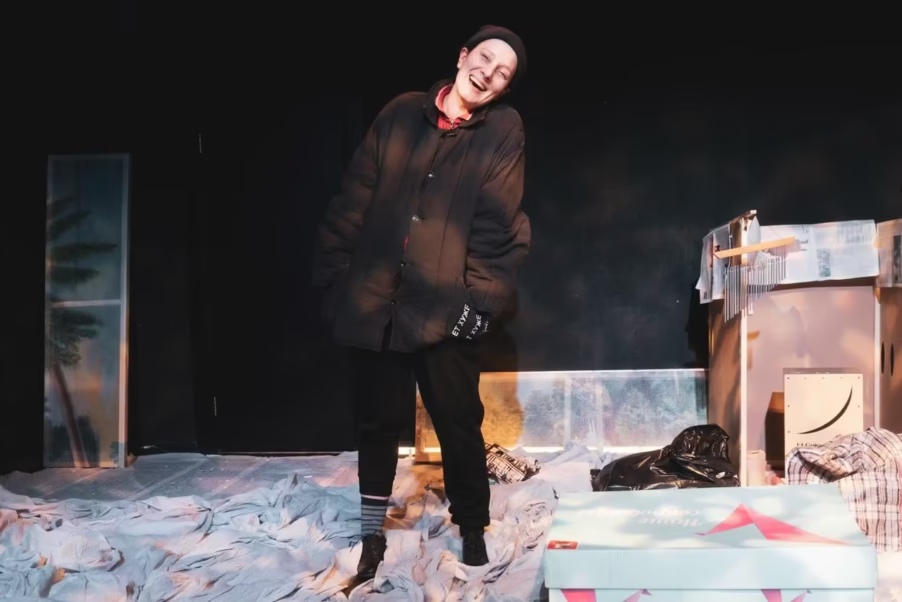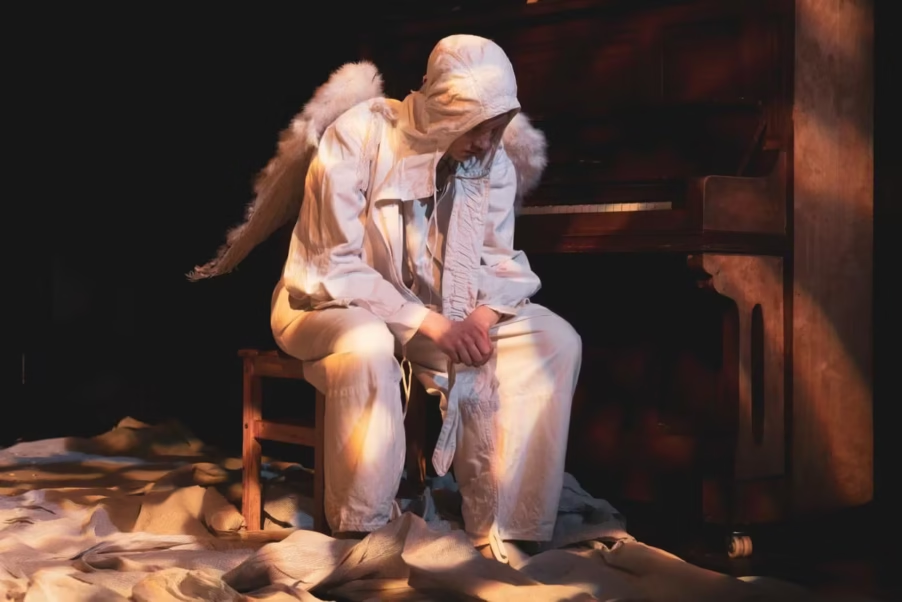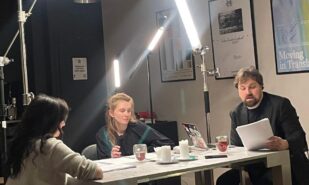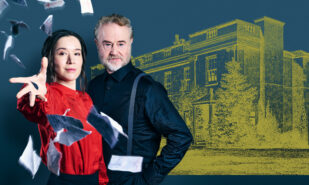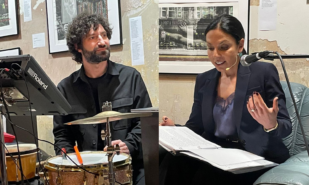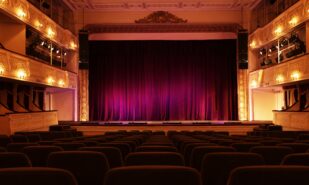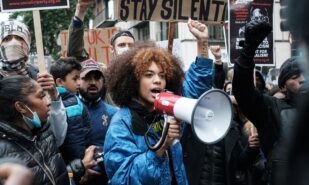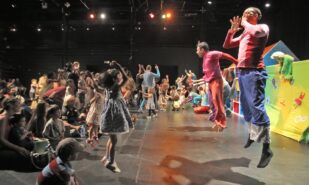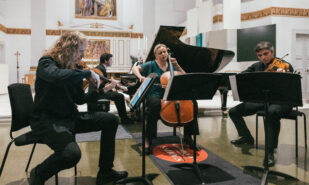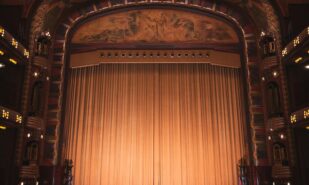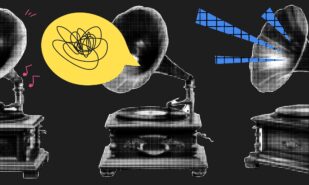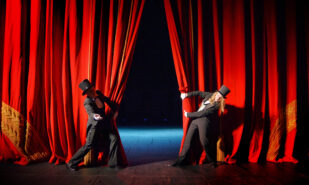Marietta Tsigal-Polischuk and Alexander Andrievich: “Happiness is coming home and hugging the dog!”
The independent theater project “SOSO’s Daughters” was established under the direction of director and playwright Zhenya Berkovich in 2018. Two “Golden Masks” in the 20/21 season for “Finist, the Bright Falcon,” full houses, interest from critics and viewers—this made “SOSO’s Daughters” an important point on the theatrical map. In 2024, Zhenya Berkovich and playwright Svetlana Petriychuk were sentenced to six years of imprisonment for “justifying terrorism.” The theater continues to exist, and now—Xameleon Theatre presents Berkovich’s play “Our Treasure” in London. We spoke with theater director Alexander Andrievich and actress Marietta Tsigal-Polischuk shortly before their flight to London.
You have known each other for many years, you studied together, but got married many years later. Does maturity provide a clearer perspective?
Marietta: First of all, we were friends in college. Then everyone got married, had children, then divorced—this had nothing to do with our current relationship, and then—sometimes it happens. None of this wisdom, no philosophical thought about the advantages of maturity. It’s pure coincidence. We met and realized that we were good together—and it’s been that way for eight years. We weren’t even planning to get married or move in together, even when Shura made me a super romantic proposal. And then, when it became uncomfortable for everyone that we suddenly decided to live together. Is this interview about our relationship or what? I’m not a fan of such interviews.
No, no, this question isn’t about private life, but rather about maturity, about adulthood. Does it offer any advantages, or is it cooler to be a young, lively lamb?
Alexander: I hadn’t really defined it. We were 18 years old—what can you understand then?
And now do you feel that you’re not 18 anymore?
Marietta: Yes, a bunch of different problems came over time—along with responsibility. Responsibility increased, and with it, the youthful giddiness inevitably had to decrease because otherwise, you can’t survive.
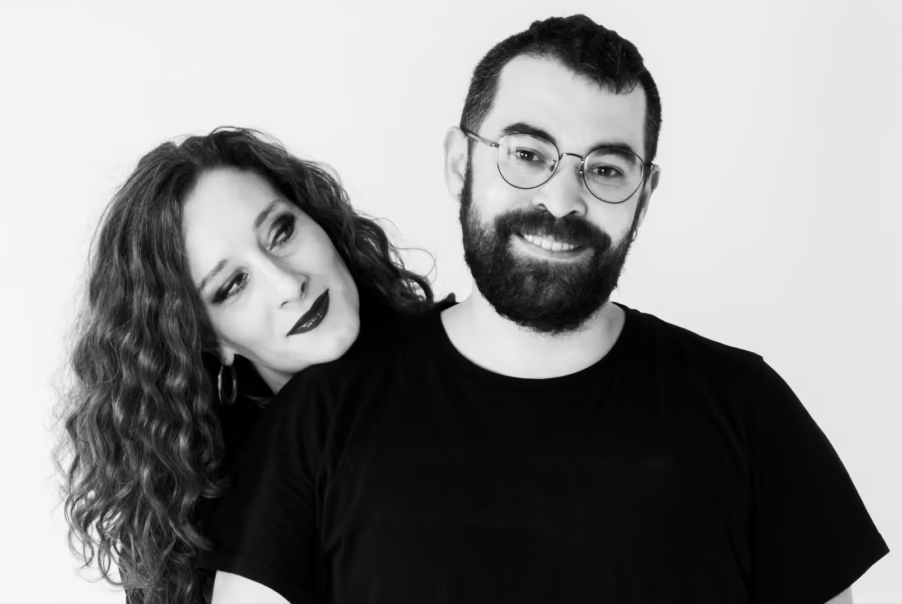
The problem isn’t that we’re adults, but that we are adults? Alexander, you’re the director of the theater. But you graduated as an actor. Do you miss acting, or to hell with it?
Alexander: To hell with it. I started my theatrical life as a props master in the “Hermitage” theater. When Mikhail Zakharovich Levitin was rehearsing “Azef,” I spent a lot of time putting together prop estimates. They even awarded me a bonus for all that, and I seriously liked it then. Later, this experience came in handy in my role as a director. Although I did act here and there—I got dragged into a film by Marietta. And I enjoyed it, although I was terribly nervous. Of course, I would come for such shifts—short and for money. And the years spent in the theater are years thrown out of life. The only thing I was glad about was when Levinsky staged “Tartuffe.” I adore Levinsky, the theater, “Near,” and “Tartuffe” was made in his manner, with biomechanics. And if Zhenya Berkovich offered me something to play, I would agree. But when I watch the girls rehearse, I think—what happiness that I have nothing to do with it anymore. Especially when Marietta played Ranevskaya, I don’t even know how she went through that, because learning such a huge amount of text…
Marietta, was it a psychologically difficult role?
Marietta: It was the most difficult and important thing I’ve done in the profession, because it’s a huge responsibility, regardless of Ranevskaya’s personality—to play a person from 18 to 82 years old is very difficult. And very interesting. Unlike Shura, who doesn’t like training, I love to learn and get into complex stories. For example, I’m completely uncoordinated, and when Yegor Druzhinin staged a play at the Theater on Malaya Bronnaya, where I then worked, I said, “Yegor, I can’t dance, but please give me time, I’ll do everything.” I really played it. I also worked in the immersive show “The Returned”—I was also learning something new there.
“Ranevskaya” was also an important project from a human perspective?
Marietta: When you’re always on set, you’re constantly surrounded by a huge number of people. And I’m a very empathetic person, I react very much to how people behave, to some human meanness, to how animals are mistreated next to me, and there were very many of them. And I had to learn to shut myself off—not to hide, but not to react to everything. I react by freezing, I stop working altogether, even saying “meow.” And then the whole process stops.
Was it important that it was a biopic?
Marietta: I keep saying that we didn’t shoot Ranevskaya directly, we shot a character we invented. I’ve always had incredible respect for Ranevskaya, I knew a lot about her. I went to the auditions and was sure that they wouldn’t take me anywhere. Years passed, directors changed, production changed—and then they approved me. And then I was really scared: Shura—witness, I seriously doubted that it was necessary to do it at all.
Alexander: And fear of the viewer, because Ranevskaya is the most beloved national actress.
Marietta: Not so much before the viewer, but before myself. I imagine that it was not me, but some other actress. And no matter how well she played, I would still say, “Take your hands off our darling!”
Alexander: Marietta didn’t watch a single episode.
Marietta: I saw a lot during the dubbing, I saw pieces when Shura watched. But not as a whole, I generally can’t watch myself. I don’t like what I do, and in order not to upset myself, I just don’t watch.
What’s the most difficult thing in your professions?
Marietta: Not to lose yourself in the pursuit of comfort. Keep learning—from people around you, from partners and directors.
Alexander: Everything just pissed me off. Until a certain moment, Zhenya Berkovich protected me very strongly from everything.
Marietta: Shura is not good at multitasking. If he’s cooking soup, he can’t simultaneously engage in a social conversation and also talk on the phone, God forbid. If he needs to write out salaries, then he must write out salaries, and will deal only with that. And he gets furious when someone asks him an important question as a director while he’s busy with something else.
Alexander: You’re exaggerating now. Of course, an important question—that’s when it’s about salary, yeah. When I came, the theater had no document flow, no advertising, nothing. And when there were 2 plays, it was simpler. But then we started playing 12 times a month. And I also perform the functions of a producer, director, accountant. And a new premiere and tours to the Netherlands, to England, to Israel all fall on me. We have a chief administrator, which makes it easier to work with the audience. In a state theater, there’s a deputy director for this part, and another for that. When there is no link in this blood system of the theater, it all either falls on one person or falls altogether. It’s difficult for me because I miss Zhenya very much—as a friend. For a year and a half, we only correspond by letters about work, and only occasionally I manage to ask about everyday life.
Do you take a lot of luggage with you on tour?
Alexander: We have ten suitcases! And then they look for various props on site—three carpets, a large flower, pots. Artist Polina Plavinskaya, who drew posters for “Finist,” “The Counting Game,” and “Rice Dog,” now lives in London. I’m just shocked at how wonderfully we are received. I just showed the rider and said, maybe after all “The Counting Game,” there are only 5 chairs, and we’ll bring the dolls ourselves! When we start rehearsing a new play in the theater, I always say, and I always told Zhenya: please make a play for four people without decorations. But in the end, no one listens to me. We now have decorations in the play “Hiroshima” just finish—a pool on stage and projection on three walls, awesome we will roll with it!
Marietta: In principle, you can, even if it’s buying at flea markets, not taking from someone by friends, buy all the props for a maximum of 150 pounds, we bring the rest—not crazy money for London. But there are things that can’t be bought.
Alexander: Marietta, for example, plays in her mother’s fox fur coat. And once I bought a quilted jacket—and for the play it’s just ideal.
Have you been to London before? Do you have a plan for one weekend day?
Marietta: Just walking. Dad asked me to stop by a store with seals, which he uses for his work. I really want to see both tourist London and punk London. But we won’t have enough for museums.
Do you have two dogs and a cat—what does it give when there are many animals at home?
Marietta: Happiness, absolute happiness, because nothing calms and delights me as much as coming home and hugging the cat and dog.
Alexander: I absolutely agree! Even though I’ve hated walking dogs since childhood. I had dogs in childhood, I had to take them out in the evenings. And when Marietta showed me Zhu, I first said I wouldn’t walk, but the dogs give me so much that it justifies everything.
Marietta: They greet us in the mornings, they come to us to say that they’ve eaten, that everything is fine with them. They’re smilers, they’re eared, they’re very kind. Well, in short, therefore, in short, only pluses. One evening I was scrolling through FriendFeed, saw a dog—quite small, but the ears were about the same as now, that is, they were practically only ears. I show the photo, and suddenly Shura says, “Well, okay, let’s go meet.” And she immediately jumps into his arms—it was such a casting, not we chose, but us. A few days later in the feed I see exactly the same ears, just a different color—turned out to be Zhu’s sister.
Alexander: But that doesn’t mean Marietta doesn’t want a French bulldog.
Marietta: If I had a house, I would probably live in a menagerie, that is, there would be hundreds of dogs, cats, rats,
Animals help cope with this horror that has fallen on you and the theater since the Berkovich case began. I’m afraid to even ask, how are you at all?
Alexander: Our everyday life has changed for all of us. Especially for Marietta very much.
Marietta: Especially at first. Now at least we can leave Zhenya’s daughters alone to stay overnight. That is, we visit them there, check on them, dress them, feed them, watch over them so they don’t skip school. But now at least they live with an established routine.
The first reaction when this all happened?
Alexander: Shock, horror, not understanding what to do.
Marietta: At 08:00 I woke up and saw two missed calls from Kira, that’s Zhenya’s youngest daughter, and from Kira’s homeroom teacher. I started calling back, realized that something had happened. And Kira says: they came to us at six in the morning with a search, they took everyone’s phones, I managed to call you from the toilet, but you didn’t pick up the phone, and Zhenya was taken. At that moment, Yura, Svetlana Petriychuk’s husband, calls me, it turns out that Svetlana was detained. We rushed to Ordynka, to the Investigative Committee. We were there until the evening. Zhenka and Svetka hung out with us on the street, we smoked, talked, because they were witnesses. But by the evening they stopped releasing them from there, and then the lawyer came out, said quickly to go home for documents and toothbrushes. It’s been since then… 7 months and 9 days.
Alexander: And what a surreal situation! I still can’t believe what happened with Zhenya, and they offer me numerous tours. Dubai, Yerevan, London, Amsterdam. Naturally, I write “Mother, as you say, because I don’t think it’s ethical to go!” She replies: “I envy you, out of my mind, but why would I deny you going to Dubai? Earn some money and see the world?” And it was like a dream. We went out together on the first morning in Amsterdam, and I couldn’t believe that I was in Europe, in such a completely benign, beautiful, cozy city. It was a warm autumn, we played our favorite plays, and it was my birthday there… And I don’t even know what to answer. The horror doesn’t go away.

